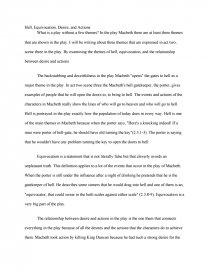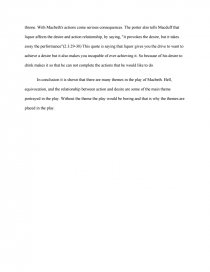Hell, Equivocation, Desire and Actions in Macbeth
Essay by Paul • May 24, 2011 • Essay • 471 Words (2 Pages) • 3,132 Views
Essay Preview: Hell, Equivocation, Desire and Actions in Macbeth
Hell, Equivocation, Desire, and Actions
What is a play without a few themes? In the play Macbeth there are at least three themes that are shown in the play. I will be writing about three themes that are expressed in act two, scene three in the play. By examining the themes of hell, equivocation, and the relationship between desire and actions.
The backstabbing and deceitfulness in the play Macbeth "opens" the gates to hell as a major theme in the play. In act two scene three the Macbeth's hell gatekeeper, the porter, gives examples of people that he will open the doors to, to bring to hell. The events and actions of the characters in Macbeth really show the lines of who will go to heaven and who will go to hell. Hell is portrayed in the play exactly how the population of today does in every way. Hell is one of the main themes in Macbeth because when the porter says, "Here's a knocking indeed! If a man were porter of hell-gate, he should have old turning the key"(2.3.1-3). The porter is saying that he wouldn't have any problem turning the key to open the doors to hell.
Equivocation is a statement that is not literally false but that cleverly avoids an unpleasant truth. This definition applies to a lot of the events that occur in the play of Macbeth. When the porter is still under the influence after a night of drinking he pretends that he is the gatekeeper of hell. He describes some sinners that he would drag into hell and one of them is an, "equivocator, that could swear in the both scales against either scale" (2.3.8-9). Equivocation is a very big part of the play.
The relationship between desire and actions in the play is the one them that connects everything in the play because of all the desires and the actions that the characters do to achieve them. Macbeth took action by killing King Duncan because he had such a strong desire for the throne. With Macbeth's actions come serious consequences. The porter also tells Macduff that liquor affects the desire and action relationship, by saying, "it provokes the desire, but it takes away the performance"(2.3.29-30) This quote is saying that liquor gives you the drive to want to achieve a desire but it also makes you incapable of ever achieving it. So because of his desire to drink makes it so that he can not complete the actions that he would like to do.
In conclusion it is shown that there are many themes in the play of Macbeth. Hell, equivocation, and the relationship between action and desire are some of the main theme portrayed in the play. Without the theme the play would be boring and that is why the themes are placed in the play.
...
...

